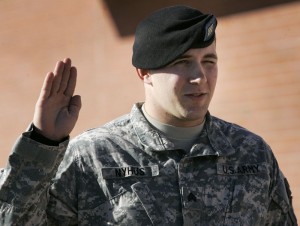Poor economy drives more troops to re-enlist
December 2, 2008 by Da-Chief
Filed under Air Force News, Army News, Coast Guard News, Corpsman.com News, Marine Corps News, Military Information, National Guard News, Navy News
FORT RILEY, Kan. — Sgt. Ryan Nyhus spent 14 months patrolling the deadly streets of Baghdad, where five members of his platoon were shot and one died. As bad as that was, he would rather go back there than take his chances in this brutal job market.
Nyhus re-enlisted last week, and in so doing joined the growing ranks of those choosing to stay in the U.S. military because of the bleak economy.
“In the Army, you’re always guaranteed a steady paycheck and a job,” said the 21-year-old Nyhus. “Deploying’s something that’s going to happen. That’s a fact of life in the Army — a fact of life in the infantry.”
In 2008, as the stock market cratered and the housing market collapsed, more young members of the Army, Air Force and Navy decided to re-up. Although several factors might explain the rise in re-enlistments, including a decline in violence in Iraq, Pentagon officials acknowledge that bad news for the economy is usually good news for the military.
In fact, the Pentagon just completed its strongest recruiting year in four years.
“We do benefit when things look less positive in civil society,” said David Chu, undersecretary of defense for personnel and readiness. “What difficult economic times give us, I think, is an opening to make our case to people who we might not otherwise have.”
The retention rate of early-career soldiers in the Army has risen steadily over the past four years and now stands 20 percentage points higher than it was in fiscal 2004. As for the Navy and the Air Force, early- and mid-career sailors and airmen re-enlisted at higher rates in October than during the same period in 2007. The Marine Corps was not immediately able to provide comparative figures on re-enlistments.
Alex Stewart joined the Army two years ago, when the factory where he worked as a welder started laying off. He was sent to Afghanistan with the 82nd Airborne Division, which suffered 87 deaths last year, the highest total suffered by the 20,000-member unit since the fighting in Iraq and Afghanistan began.
When his hitch was up in earlier this year, the 32-year-old from Grand Rapids, Mich., didn’t hesitate to re-up for five more years.
“I want a stable life for my wife in a very shaky economy,” Stewart said. “There were no other options.”
Stewart’s new assignment will take him to Germany, where he will serve as a truck driver, although it is always possible he could be sent back into combat.
“I figure if I do another five or 10 years in the Army,” he said, “the economy will turn around and I can get a truck-driving job.”
Army Spc. Alicia Fauls, 20, of the Woodlands, Texas, had two years to go when she re-enlisted last week at Fort Riley, home of the Army’s 1st Infantry Division, which has one brigade in Iraq, one headed home and another preparing to ship out. She has not been sent into the war zone yet but knows an assignment in Iraq or Afghanistan is probably in her future.
“I did have only two years left, but I’m not sure what I would do,” Fauls said. “It’s harder to find jobs. If I do wait to get out, the economy should be in better shape.”
When Nyhus’ tour in Iraq ended in April, he talked to his wife about getting out of the Army and working toward a college degree. But the father of a 2-year-old daughter opted for the job security, even though he is likely to be sent back to Iraq as a member of the 4th Infantry Division, which has shouldered a heavy burden of the fighting.
Marine Staff Sgt. Angela Mink, who was injured in a helicopter accident in Iraq in 2004 and now works in public affairs at the Corps’ New River Air Station, N.C., said the thought of taking a civilian job “without my fellow Marines just didn’t appeal to me.” Moreover, she had little hope of finding a private-sector job that pays as well as the Corps.
“Equivalent pay is nonexistent, once you factor in insurance premiums, housing costs,” said Mink, 37. “And we would definitely have had to relocate. I have a child with a disability, and what civilian employer is going to take that into consideration when they think of moving you somewhere?”
And so the married mother of five signed up recently for four more years.
Roughly 208,000 men and women left the military in 2007. Some were rank-and-file warriors, while others worked in specialized fields such as satellite communications or computer networking. About 30 percent of enlisted soldiers hold a bachelor’s degree.
The job market is still fairly good for veterans with technical skills, especially those coveted by defense contractors, said Carl Savino, a retired Army major who runs a company outside Washington, D.C., that offers employment services to new veterans.
Sgt. Michael Rodriguez, 29, of San Antonio, decided to get out after he landed a job with a defense contractor working on communications systems. “I feel pretty secure with them,” said Rodriguez, who will leave the military soon.
But even defense-contractor jobs could dry up as the economic crisis deepens, Savino said.
“Jobs are getting harder to come by for veterans,” Savino said. “The farther they deviate from the defense contractors, who are still in reasonably strong shape, the more challenging it is.”










Hello, for a long time I read your blog, thanks for that that write interesting and
useful posts.я I consider that blogers it is possible to name many journalists.
Good luck
Hello, for a long time I read your blog, thanks for that that write interesting and
useful posts.я I consider that blogers it is possible to name many journalists.
Good luck